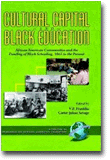
Cultural Capital and Black Education
African American Communities and the Funding of Black
Edited by:
V.P. Franklin, Teachers College, Columbia University
A volume in the series: Research on African American Education. Editor(s): Carol Camp Yeakey, Washington University, St. Louis. Rowhea Medhat Elmesky, Washington University in St. Louis. Bronwyn Nichols Lodato, Washington University in St. Louis.
Published 2004
A discussion of the contributions made by African Americans to public and private black schools in the USA in the 19th and 20th centuries. It suggests that cultural capital from African American communities may be important for closing the gap in the funding of black schools in the 21st century.
CONTENTS
Foreword. Introduction, V.P. Franklin. "I Must Learn Now or Not at All": Social and Cultural Capital in the Educational Initiatives of Formerly Enslaved African Americans in Mississippi, 1862-1869, Christopher M. Span. Owning, Controlling, and Building Upon Black Cultural Capital: The Albany Enterprise Academy and Black Education in Southeast Ohio, 1863-1886, Adah Ward Randolph. Cultural Capital and Black Higher Education: The AME Colleges and Universities as Collective Economic Enterprises, 1865-1910, V.P. Franklin. Our School in Our Community: The Collective Economic Struggle for African American Education in Franklin, Tennessee, 1890-1967, Carter Julian Savage. Community, Commitment, and African American Education: The Jackson School of Smith County, Texas, 1925-1954, Peggy B. Gill. "Sister Laborers": African American Women, Cultural Capital, and Educational Philanthropy, 1865-1970, Bettye Collier-Thomas. "Maintaining a Home for Girls": The Iowa Federation of Colored Women’s Clubs at the University of Iowa, 1919-1950, Richard M. Breaux. Paradise Lost?: Teachers’ Perspectives on the Use of Cultural Capital in the Segregated Schools of New Orleans, Louisiana, Monica A. White. Social Capital, Cultural Capital, and the Challenge of African American Education in the 21st Century, V.P. Franklin.
REVIEWS
"This book helps dispel the myth that African Americans do not value education by demonstrating the sacrifices that freed slaves made to educate themselves and their children." Mary Dolores Guerra Arizona State University in Education Review (Read full review)
-
Paperback978-1-59311-040-6
Web price: $45.04 (Reg. 52.99)
-
Hardcover978-1-59311-041-3
Web price: $80.74 (Reg. 94.99)
- eBook9781607528425

-
 From Disagreement to Discourse
A Chronicle of Controversies in Schooling and Education
From Disagreement to Discourse
A Chronicle of Controversies in Schooling and Education
-
 Living at the Intersections
Social Identities and Black Collegians
Living at the Intersections
Social Identities and Black Collegians
-
 Shuttered Schools
Race, Community, and School Closures in American Cities
Shuttered Schools
Race, Community, and School Closures in American Cities
-
 Surmounting all Odds - Vol. 1&2
Equalizing Education Opportunities in the New Millennium (Vol 1 & 2)
Surmounting all Odds - Vol. 1&2
Equalizing Education Opportunities in the New Millennium (Vol 1 & 2)
-
 The Broken Cisterns of African American Education
Academic Performance and Achievement in the Post-Brown Era
The Broken Cisterns of African American Education
Academic Performance and Achievement in the Post-Brown Era
-
 Towards a Brighter Tomorrow
The College Barriers, Hopes and Plans of Black, Latino/a and Asian American Students in California
Towards a Brighter Tomorrow
The College Barriers, Hopes and Plans of Black, Latino/a and Asian American Students in California
-
 Using Past as Prologue
Contemporary Perspectives on African American Educational History
Using Past as Prologue
Contemporary Perspectives on African American Educational History

